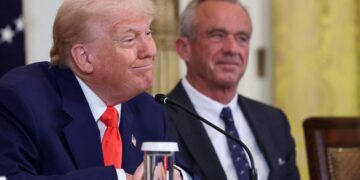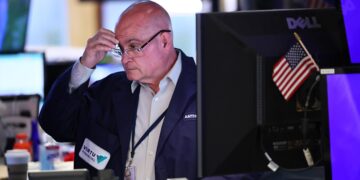2-minute read
People on Wall Street react to sinking stocks from tariffs
People on Wall Street reacted to the stock market downturn from Trump’s tariffs announcement with a mix of worry and optimism.
- $2.4 trillion in stock market value lost by S&P 500 companies.
- $208 billion is how much the world’s 500 richest people lost on Thursday.
- $17.9 billion is how much Meta founder Mark Zuckerberg lost on Thursday.
The U.S. stock market took a major hit on Thursday in the fallout from President Donald Trump’s sweeping tariffs.
“The size and scope of the tariffs announced exceeded even some of the most bearish forecasts,” Mona Mahajan, head of investment strategy at Edward Jones, told Reuters. “This is something that markets are starting to realize could have a meaningful impact on both economic growth and obviously inflation.”
Even the dollar weakened to a six-month low against Japan’s yen and the Swiss franc.
The dramatic drop spared no one as even the world’s richest people lost billions.
Here’s a look at the staggering numbers from Thursday:
By the numbers
- $2.4 trillion in stock market value lost by S&P 500 companies, their biggest such one-day loss since the emerging coronavirus pandemic ripped through global markets on March 16, 2020.
- $208 billion is how much the world’s 500 richest people lost on Thursday, Bloomberg News reports. In the 13-year history of the Bloomberg Billionaires Index, this is the fourth-largest one-day decline.
- $17.9 billion is how much Meta founder Mark Zuckerberg lost on Thursday, Bloomberg News said.
- $15.9 billion is the amount Jeff Bezos was down as Amazon’s stock fell by 9% on Thursday, according to Bloomberg.
- $11 billion is what Thursday’s plunge cost Elon Musk as Tesla shares fell 5.5%, Bloomberg said.
- 1,700 points is how far the Dow dropped on Thursday
- 4.8% drop (275 points) for the S&P 500, it’s largest one-day drop since June 2020.
- 6% (1,050 points) is how much the Nasdaq Composite fell, its biggest daily loss since March 2020.
- 9.25% is how much value Apple stock lost on Thursday because of its large manufacturing base in China.
What experts are saying
“Coming into this year, there was this assumption that this administration would be brilliant for the U.S. economy and difficult for the rest of the world,” Hugh Gimber, global market strategist at J.P. Morgan Asset Management in London, told Reuters. “It’s increasingly evident this policy mix in the U.S. is more difficult for the U.S. itself.”
“The next week will be critical as the highest tariff rates go in on April 9,” Jeff Buchbinder, Chief Equity Strategist for LPL Financial, told USA Today. “Stocks should stabilize once negotiations start to bear fruit and take rates down, assuming it’s clear to markets that no meaningful tariff rates will be increased further because of retaliation.”
“Investors are clearly concerned about retaliation by other governments that could lead to a global recession,” Oliver Pursche, senior vice president at Wealthspire Advisors in New York, told Reuters. “But we’ve also learned just over the last couple of months… on-and-off again tariffs are not unusual for (Trump). So we’ll have to see how long the tariffs stay in place.”
The article contains material from Reuters and USA Today.





















